Planning a trip to London? What To Know Before Traveling To London includes understanding the city’s culture, transportation, weather, and must-see attractions. TRAVELS.EDU.VN offers expert advice to ensure your London adventure is smooth and unforgettable. Get ready to explore the best of London with these essential tips and tricks, enhancing your travel experience with valuable insights into iconic landmarks and hidden gems, making your visit truly special.
1. What is the Best Time to Visit London?
The best time to visit London is typically during the shoulder seasons, from April to May and September to October. These months offer pleasant weather, fewer crowds, and lower prices compared to the peak summer months of July and August. Summer in London can be crowded and more expensive, while winter (November to March) can be cold and damp, although the city is beautifully decorated for the holidays.
To expand, London’s shoulder seasons provide a sweet spot for travelers. The weather is generally mild, making it comfortable to explore the city’s many outdoor attractions. Parks like Hyde Park and St. James’s Park are particularly beautiful during these months. Additionally, fewer tourists mean shorter lines at popular attractions such as the Tower of London and the London Eye. Hotel rates and airfares are also usually more affordable during these times, allowing you to stretch your budget further. However, avoid bank holidays and school holidays, as these periods can see an increase in domestic travel and higher prices. For accurate weather forecasts, consult the UK Met Office.
2. How Do You Get Around London?
London boasts an extensive and efficient public transportation system, including the Underground (Tube), buses, trams, and trains. The Underground is the quickest way to travel long distances, while buses offer a scenic route through the city. Contactless payment is widely accepted on all forms of transport.
For more details, the London Underground, or Tube, is divided into zones, with Zone 1 covering central London. Oyster cards and contactless payment cards can be used on all services, making travel seamless. The TFL (Transport for London) app provides real-time updates on train schedules, line closures, and alternative routes. Buses are a great way to see the city, with many routes operating 24/7. Consider purchasing a day travelcard if you plan to use public transport extensively. Walking is also a fantastic way to explore central London, especially areas like Westminster and South Bank. According to TFL, over 1.3 billion journeys are made on the Underground each year, highlighting its importance to the city.
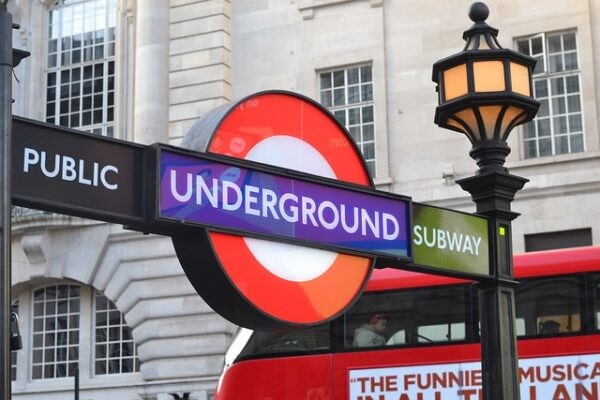 London Underground Sign
London Underground Sign
3. What Should You Pack for a Trip to London?
Packing for London requires versatility due to the city’s unpredictable weather. Essentials include layers like sweaters, waterproof jackets, comfortable walking shoes, and an umbrella. Don’t forget a universal adapter for your electronics.
To elaborate, London’s weather can change rapidly, so layering is key. A lightweight, waterproof jacket is a must-have, as rain is common throughout the year. Comfortable walking shoes are essential for exploring the city’s many attractions on foot. A versatile wardrobe that can be dressed up or down is ideal for dining out or visiting theaters. According to Visit London, the average temperature in London ranges from 5°C (41°F) in winter to 22°C (72°F) in summer, emphasizing the need for adaptable clothing. Also, consider packing a stylish scarf, as it can add warmth and flair to your outfits.
4. What are the Must-See Attractions in London for First-Time Visitors?
Must-see attractions in London for first-time visitors include the Tower of London, Buckingham Palace, the Houses of Parliament, Westminster Abbey, the London Eye, and the British Museum. Each offers a unique glimpse into London’s history and culture.
Specifically, the Tower of London is a historic castle with a rich and often dark past, housing the Crown Jewels and offering guided tours. Buckingham Palace is the residence of the Queen, famous for the Changing of the Guard ceremony. The Houses of Parliament and Westminster Abbey are iconic landmarks representing British governance and history. The London Eye provides panoramic views of the city, and the British Museum houses a vast collection of world art and artifacts. According to the Association of Leading Visitor Attractions (ALVA), these sites are among the most visited in the UK, attracting millions of tourists annually. Consider booking tickets in advance to avoid long queues, especially during peak season.
5. What is the Local Currency and How Do You Handle Money in London?
The local currency in London is the British Pound (GBP). Credit and debit cards are widely accepted, and contactless payments are common. It’s advisable to carry some cash for smaller establishments or tipping.
In detail, while credit cards are widely used, it’s helpful to have some cash on hand for smaller purchases or in establishments that may not accept cards. ATMs are readily available throughout the city. Inform your bank of your travel plans to avoid any issues with your cards. Tipping is customary in restaurants (10-15%), taxis, and for certain services. According to UK Finance, contactless payments accounted for 60% of all card transactions in 2023, highlighting their prevalence. Also, consider using a travel credit card that offers rewards or no foreign transaction fees.
6. What is the Etiquette and Culture Like in London?
Londoners are generally polite and reserved. Queuing is taken seriously, and it’s customary to say “please” and “thank you.” Be mindful of personal space, and avoid loud or disruptive behavior in public places.
For example, queuing is a deeply ingrained part of British culture, so always wait your turn. Politeness is highly valued, and using “please” and “thank you” is essential. Public transport etiquette includes offering seats to the elderly or pregnant women. It’s also customary to stand on the right side of escalators to allow others to pass on the left. According to a study by YouGov, 75% of Britons consider good manners to be very important, underscoring the significance of etiquette in daily life. Embrace these customs to show respect and integrate more seamlessly into the local culture.
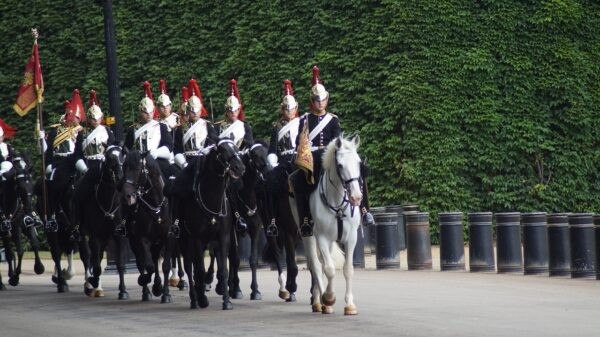 Changing of the Guard
Changing of the Guard
7. Where Can You Find Affordable Accommodation in London?
Affordable accommodation options in London include budget hotels, hostels, and Airbnb rentals outside the city center. Consider areas like Shoreditch, Camden, or Greenwich for more budget-friendly stays.
To elaborate, budget hotels such as Premier Inn and Travelodge offer comfortable and affordable rooms. Hostels provide dormitory-style accommodations and communal areas, ideal for solo travelers or those on a tight budget. Airbnb offers a range of options, from private rooms to entire apartments, often at lower prices than traditional hotels. Staying outside Zone 1 can significantly reduce accommodation costs. According to a report by Statista, the average daily rate for a hotel room in London in 2023 was £150, but prices can vary widely depending on location and time of year. Booking in advance and comparing prices across different platforms can help you find the best deals.
8. What are Some Unique and Offbeat Things to Do in London?
Unique and offbeat things to do in London include exploring Leake Street Graffiti Tunnel, visiting God’s Own Junkyard, taking a canal boat tour in Little Venice, and exploring the shops and markets of Camden Town.
For instance, Leake Street Graffiti Tunnel is a legal graffiti area where artists create vibrant and ever-changing street art. God’s Own Junkyard is a neon wonderland filled with vintage signs and colorful displays. A canal boat tour in Little Venice offers a tranquil escape from the city’s hustle and bustle. Camden Town is known for its alternative fashion, quirky shops, and lively markets. According to Time Out London, these hidden gems offer a unique perspective on the city and are popular among locals and adventurous travelers. Exploring these lesser-known attractions can provide a more authentic and memorable experience.
9. Are There Any Safety Concerns in London?
London is generally a safe city, but it’s important to be aware of your surroundings and take precautions against petty theft, especially in crowded areas and on public transport.
Specifically, like any major city, London experiences petty crime such as pickpocketing, particularly in tourist hotspots. Keep your valuables secure and be cautious of your belongings, especially on crowded trains and buses. Avoid walking alone in poorly lit areas at night. In case of an emergency, dial 999 for police, ambulance, or fire services. According to the Metropolitan Police, crime rates in London are generally lower than in other major cities, but it’s always best to remain vigilant.
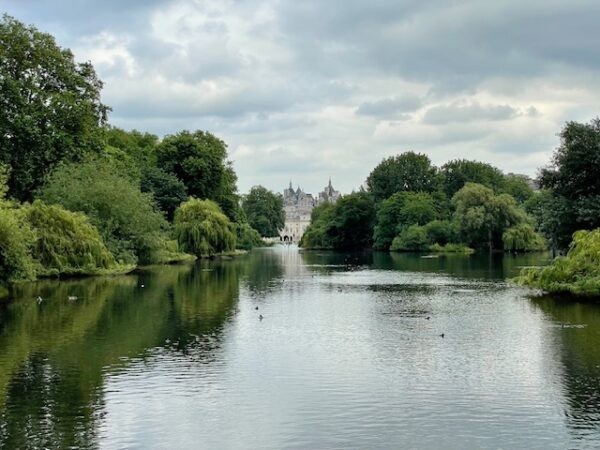 St. James Park
St. James Park
10. What Are Some Popular Day Trips from London?
Popular day trips from London include visiting Stonehenge, Bath, Oxford, Cambridge, and the Cotswolds. Each destination offers a unique glimpse into England’s history and natural beauty.
In detail, Stonehenge is a prehistoric monument steeped in mystery, while Bath is a historic city known for its Roman baths and Georgian architecture. Oxford and Cambridge are home to world-renowned universities with stunning architecture and rich academic history. The Cotswolds is a picturesque region of rolling hills and charming villages. According to Visit Britain, these destinations are easily accessible by train or bus and offer a welcome escape from the city. Planning a day trip can enhance your London experience by providing a broader perspective on the UK’s diverse landscapes and cultural heritage.
11. How Do You Navigate London’s Different Accents and Slang?
Navigating London’s diverse accents and slang can be challenging, but understanding a few common terms can be helpful. “Tube” refers to the Underground, “loo” means toilet, and “cheers” can mean thank you or goodbye.
To elaborate, London is a multicultural city with a wide range of accents and dialects. Familiarizing yourself with a few common slang terms can make communication easier. “Mind the gap” is a common announcement on the Underground, warning passengers to watch the space between the train and the platform. “Bloke” means man, and “cuppa” means cup of tea. If you’re unsure of what someone means, don’t hesitate to ask for clarification. According to the British Library, London’s linguistic diversity is a reflection of its rich cultural heritage.
12. What are the Best Apps to Use While Traveling in London?
The best apps to use while traveling in London include Citymapper for navigation, TFL Oyster and Contactless for managing public transport payments, and OpenTable for restaurant reservations.
Specifically, Citymapper provides real-time travel information, including route planning, bus and train schedules, and disruption alerts. TFL Oyster and Contactless allows you to manage your Oyster card and track your travel expenses. OpenTable helps you find and book restaurants, read reviews, and view menus. According to a survey by App Annie, these apps are consistently ranked among the most useful for navigating and enjoying London.
13. What are Some Traditional Foods to Try in London?
Traditional foods to try in London include fish and chips, afternoon tea, Sunday roast, and full English breakfast. These dishes offer a taste of British culinary heritage.
In detail, fish and chips is a classic dish consisting of battered and deep-fried fish served with chips (french fries). Afternoon tea is a quintessential British experience, featuring tea, scones, sandwiches, and pastries. Sunday roast is a traditional meal of roasted meat, vegetables, and Yorkshire pudding. Full English breakfast includes eggs, bacon, sausage, baked beans, and toast. According to a report by the Food Standards Agency, these dishes are widely available in pubs, restaurants, and cafes throughout London. Sampling these traditional foods is a must for any visitor wanting to experience the local cuisine.
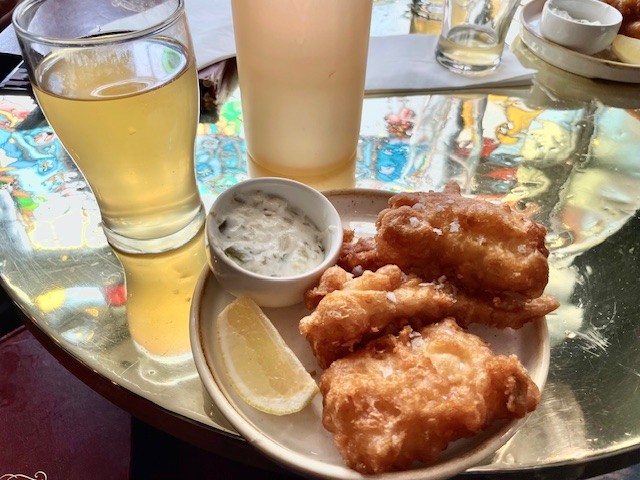 Fish & chips and beer London travel tips
Fish & chips and beer London travel tips
14. What are Some Free Things to Do in London?
Free things to do in London include visiting the British Museum, the National Gallery, walking through Hyde Park, and attending free events and festivals.
For example, the British Museum and the National Gallery offer free admission to their permanent collections, showcasing world art and artifacts. Hyde Park is a vast green space perfect for walking, picnicking, and enjoying the outdoors. London hosts numerous free events and festivals throughout the year, including cultural celebrations and outdoor performances. According to Visit London, these free activities provide a budget-friendly way to experience the city’s rich culture and attractions.
15. What Should You Know About London’s Healthcare System for Tourists?
Tourists in London are generally not entitled to free healthcare, except for emergencies. It’s essential to have travel insurance that covers medical expenses.
To elaborate, the National Health Service (NHS) provides free healthcare to UK residents, but tourists are typically required to pay for medical treatment. Exceptions include emergency care and treatment for certain infectious diseases. It’s crucial to purchase comprehensive travel insurance that covers medical expenses, including hospitalization and repatriation. According to the NHS website, visitors from outside the European Economic Area (EEA) are usually required to pay for healthcare services.
16. How Do You Get From London Airports to the City Center?
Getting from London airports to the city center is easy via the Heathrow Express, Gatwick Express, Stansted Express, and various bus and taxi services.
Specifically, the Heathrow Express is a fast train service that connects Heathrow Airport to Paddington Station in central London. The Gatwick Express provides a similar service from Gatwick Airport to Victoria Station. The Stansted Express connects Stansted Airport to Liverpool Street Station. Numerous bus services, such as National Express, offer more affordable transportation to various locations in London. Taxis are readily available at all airports but can be more expensive. According to the airport websites, these transportation options provide convenient and efficient ways to reach the city center.
17. What Are Some Tips for Saving Money on Food and Drink in London?
Tips for saving money on food and drink in London include eating at local markets, utilizing meal deals, and taking advantage of free water refills.
In detail, local markets such as Borough Market and street food stalls offer affordable and tasty meals. Many restaurants and pubs offer meal deals, such as lunch specials or early bird menus. Taking advantage of free water refills at restaurants and cafes can help you save money on drinks. According to a survey by Which?, these strategies can significantly reduce your food and drink expenses while traveling in London.
18. What Should You Know About Tipping in London?
Tipping in London is customary in restaurants, taxis, and for certain services. A tip of 10-15% is generally expected in restaurants, while rounding up the fare is common in taxis.
For example, in restaurants, a service charge of 12.5% is sometimes added to the bill, so check before you tip. Tipping is not expected in pubs or fast-food establishments. For services such as hairdressing or spa treatments, a tip of 10-15% is also customary. According to a guide by the UK consumer group, understanding these tipping norms can help you navigate social situations and show appreciation for good service.
19. What Are Some Common Scams to Watch Out For in London?
Common scams to watch out for in London include street gambling, fake charity collectors, and overpriced taxi rides.
Specifically, street gambling involves people enticing tourists to participate in games of chance, which are often rigged. Fake charity collectors may approach you for donations, but the money may not go to a legitimate cause. Overpriced taxi rides can occur if you don’t use licensed taxis or agree on a fare beforehand. According to the Metropolitan Police, being aware of these scams and taking precautions can help you avoid becoming a victim.
20. How Can TRAVELS.EDU.VN Help You Plan Your Trip to London?
TRAVELS.EDU.VN offers expertly curated travel packages, insider tips, and personalized support to make your London trip unforgettable. We handle all the details, so you can focus on enjoying your adventure.
In detail, TRAVELS.EDU.VN provides a range of services, including customized itineraries, hotel and transportation bookings, and access to exclusive tours and activities. Our team of travel experts has extensive knowledge of London and can offer personalized recommendations based on your interests and budget. We also provide 24/7 support to ensure your trip runs smoothly. Contact us today at 123 Main St, Napa, CA 94559, United States, or Whatsapp: +1 (707) 257-5400. Visit our website at TRAVELS.EDU.VN to start planning your dream trip to London.
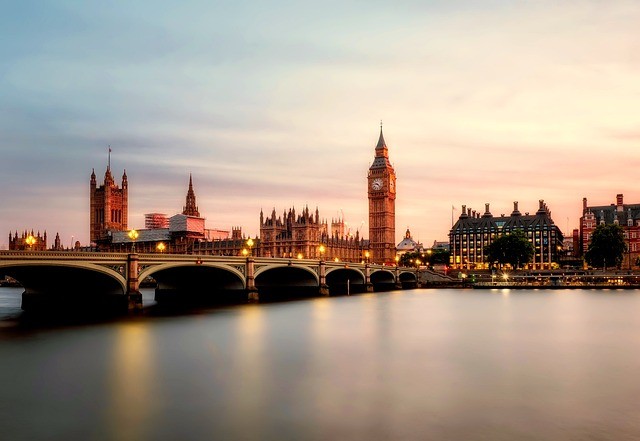 Big Ben on the River Thames sunset
Big Ben on the River Thames sunset
Frequently Asked Questions (FAQ) About Traveling to London
1. Is London an expensive city to visit?
Yes, London can be an expensive city, but careful planning and budgeting can help manage costs.
2. Do I need a visa to visit London?
Visa requirements depend on your nationality. Check the UK government’s website for the latest information.
3. What is the best way to stay connected to the internet in London?
You can use international roaming, purchase a local SIM card, or utilize free Wi-Fi hotspots.
4. Are there any cultural norms I should be aware of?
Be polite, queue properly, and avoid loud or disruptive behavior in public places.
5. What are some family-friendly activities in London?
Visit the London Zoo, the Science Museum, or take a ride on the London Eye.
6. How can I avoid crowds at popular attractions?
Visit during off-peak seasons or book tickets in advance to avoid long queues.
7. What are some good areas to stay in London for tourists?
Central areas like Westminster, South Bank, and Kensington are convenient for sightseeing.
8. Is London a walkable city?
Yes, central London is very walkable, but public transport is essential for covering longer distances.
9. What are some hidden gems in London that are worth visiting?
Explore Little Venice, Leake Street Graffiti Tunnel, or God’s Own Junkyard for unique experiences.
10. How do I use the London Underground (Tube)?
Purchase an Oyster card or use contactless payment, and plan your journey using the TFL app.
travels.edu.vn is your ultimate resource for planning an unforgettable trip to London. With our expert advice and personalized services, you can explore the best of this vibrant city with confidence. Contact us today to start your adventure.